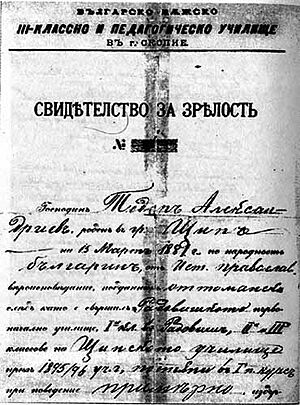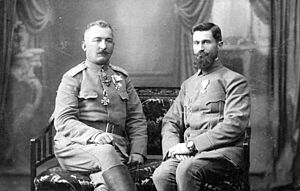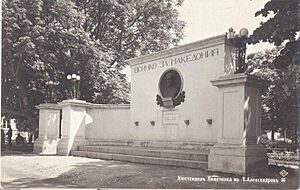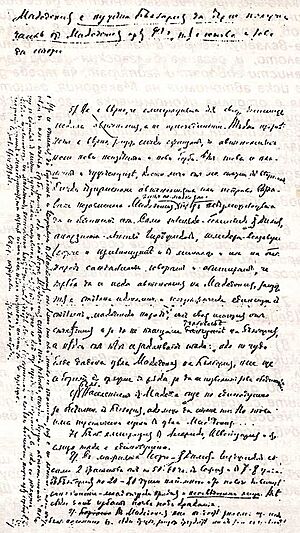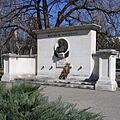Todor Aleksandrov facts for kids
Quick facts for kids
Voivode
Todor Aleksandrov
|
|
|---|---|
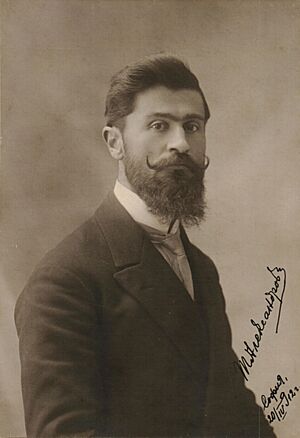
A portrait of Aleksandrov with an autograph and dedication to Yavorov (Sofia, 1912).
|
|
| Native name |
Тодор Александров Попорушев
|
| Birth name | Todor Alexandrov Poporushev |
| Born | 4 March 1881 Novo Selo, Kosovo Vilayet, Ottoman Empire |
| Died | 31 August 1924 Sugarevo, Tsardom of Bulgaria |
| Allegiance | |
| Service/ |
|
| Unit | Macedonian-Adrianopolitan Volunteer Corps |
| Battles/wars |
|
| Alma mater | Bulgarian Pedagogical School of Skopje Bulgarian Men's High School of Thessaloniki |
| Spouse(s) | Vangelia Aleksandrova |
| Children | Alexander Aleksandrov Maria Aleksandrova |
Todor Aleksandrov Poporushov, known as Todor Alexandrov (born March 4, 1881 – died August 31, 1924), was a famous Bulgarian revolutionary. He was also an army officer, politician, and teacher.
He first wanted Macedonia to become part of Bulgaria. Later, he changed his mind. He then supported the idea of an Independent Macedonia. This would be like a second Bulgarian state in the Balkans. Alexandrov was an important member of the Internal Macedonian Revolutionary Organisation (IMRO).
In North Macedonia, Aleksandrov was once seen as a controversial figure. But now, he is recognized as part of the country's history. This has led to some public discussions.
Contents
Todor Aleksandrov's Early Life and Education
Aleksandrov was born in Novo Selo, which was part of the Ottoman Empire. Today, this place is a suburb of Štip in North Macedonia. His parents were Aleksandar Poporushev and Marija Aleksandrova.
In 1898, he finished the Bulgarian Pedagogical School in Skopje. After that, he worked as a Bulgarian teacher. He taught in towns like Kočani, Kratovo, Vinica, and Štip. He also studied at the Bulgarian Men's High School of Thessaloniki.
Becoming a Revolutionary Leader
In 1903, Aleksandrov showed great skills as a leader. He helped organize the Kočani Revolutionary District. Ottoman authorities arrested him on March 3, 1903. He was sent to Skopje and sentenced to five years in prison.
In April 1904, he was released from prison. Soon after, he became a head teacher in Štip. Aleksandrov worked hard with Todor Lazarov and Mishe Razvigorov. They helped organize the Štip Revolutionary District.
The Ottoman authorities noticed his activities. In November 1904, he was forbidden to teach. On January 10, 1905, soldiers surrounded his house. But he managed to escape and joined Mishe Razvigorov's cheta (a small armed group). He became its secretary.
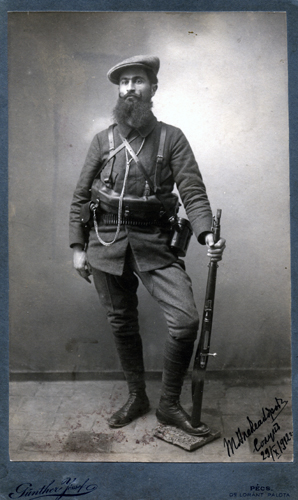
Joining the IMARO Movement
His health got worse, so he became a teacher in Burgas, Bulgaria, in 1906. But when he heard that Mishe Razvigorov had died, he left his teaching job. He immediately returned to Macedonia.
In November 1907, Aleksandrov was chosen as a district commander, known as a vojvoda. This happened at the Third Congress of the Skopje Revolutionary District.
On August 2, 1909, the Ottomans tried to arrest him again, but they failed. In early 1911, Aleksandrov became a member of the Central Committee of the IMARO.
Role in Wars and Resistance
In 1912, he became a vojvoda in the Kilkis and Thessaloniki areas. He carried out many acts of sabotage against Ottoman targets. This helped the Bulgarian cause in the First Balkan War. He also supported the Bulgarian Army.
In 1913, he was part of the Third brigade of the Macedonian Militia in the Bulgarian army. After 1913, he organized the IMARO's resistance against other groups, like Serbs and Greeks.
When Bulgaria joined World War I in October 1915, Todor Alexandrov became a soldier. He worked hard to organize the administration in the areas occupied by Bulgaria. On November 4, 1919, Aleksandrov was arrested. But he managed to escape nine days later.
In 1920, Aleksandrov went to Vardar Macedonia with his cheta. He rebuilt the revolutionary organization there. He also brought attention to the "Macedonian question" around the world. By the end of 1922, Serbian authorities offered a large reward for his capture.
Negotiations and Death
In 1924, IMRO talked with the Comintern, a communist organization. They discussed working together to create a united Macedonian movement. The Soviet Union supported this idea. They hoped to use this movement to spread revolution in the Balkans.
Alexandrov wanted IMRO to remain independent. He refused most of the communists' demands. They did not reach a full agreement. However, they did create a document called the "May Manifesto" on May 6, 1924. This paper stated the goals of the Macedonian liberation movement. These goals included an independent and united Macedonia. It also mentioned fighting against Balkan monarchies and working with the Soviet Union.
The Comintern published the Manifesto on July 28, 1924. Todor Aleksandrov and Aleksandar Protogerov quickly said they had never signed any such agreement. They claimed the May Manifesto was a communist fake.
Soon after, Alexandrov was killed in unclear circumstances. A member of his cheta shot him on August 31, 1924. This happened in the Pirin Mountains. He had a wife named Vangelia and two children, Alexander and Maria. Maria strongly supported her father's ideas.
Todor Aleksandrov's Vision for Macedonia
IMRO and Alexandrov wanted an independent Macedonia. They imagined its capital in Salonika. They believed that Macedonian Bulgarians would be the main group there. He also thought that parts of Macedonia under Greek and Bulgarian rule should join this independent Macedonia. His views clearly showed he believed that Macedonian Slavs were ethnically Bulgarian at that time.
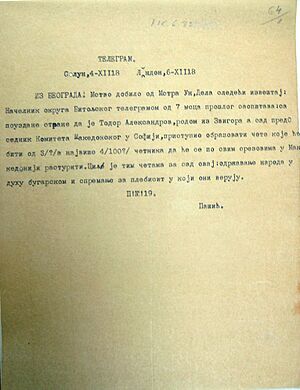
Todor Aleksandrov's Legacy
In the past, during the Yugoslav era, some historians saw Aleksandrov as a "traitor" to the Macedonian movement. This was because of his pro-Bulgarian views.
After North Macedonia became independent, efforts were made to re-evaluate Aleksandrov's role. Many Macedonian historians once called him "the biggest traitor to the Macedonian cause." Others blamed him for the deaths of other IMRO members and political figures.
However, some historians have called him "the soul and the brain of the Macedonian resistance." They also called him "Macedonia’s Robin Hood." They praised his amazing organizational skills and strong will.
In 2008, a local group of Bulgarians put up a monument to him in Veles. The local government did not want to provide a place for it. So, it was put in a local resident's yard. The monument was later removed by authorities, saying it was built illegally. This incident led to discussions between the Bulgarian and Macedonian presidents about Aleksandrov's history.
In June 2012, a new statue called “Macedonian Equestrian Revolutionary” was put up in Skopje. Many older residents noticed it looked like Todor Aleksandrov. Later, a sign with his name was added to the monument.
In 2021, the Skopje city council decided to rename many local places. A bridge named after Alexandrov and a street named after IMRO were renamed. The former Skopje Mayor said this erased part of Macedonian history.
Honours and Recognition
Aleksandrov Peak in Antarctica is named after Todor Aleksandrov.
Images for kids
See also
 | Janet Taylor Pickett |
 | Synthia Saint James |
 | Howardena Pindell |
 | Faith Ringgold |


